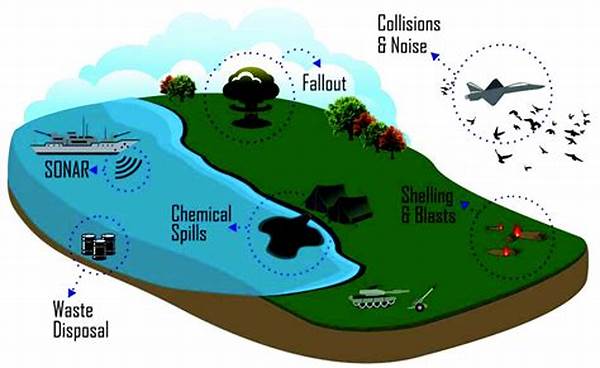The presence and activities of military forces across the globe have undeniably contributed to the shaping of our natural environment. Military operations are often conducted on vast stretches of land, seas, and even airspaces, bringing about complex interactions between human endeavors and the Earth’s ecosystems. While the primary objective of militaries is to ensure national security and defense, the environmental consequences of their actions warrant significant attention. Recognizing the impact of military on nature is crucial, as it not only affects the immediate surroundings but also has far-reaching implications for global biodiversity and ecological balance.
Military Training and Land Degradation
Military training exercises, although essential for preparedness, have a substantial impact on the natural landscapes where they are conducted. The relentless movement of troops, use of heavy machinery, and frequent firing drills contribute to soil erosion, vegetation damage, and habitat destruction. Areas designated for military training often undergo significant degradation, affecting not only the local flora and fauna but also altering the region’s topography. Moreover, the introduction of explosives and other hazardous materials during training can lead to soil and water contamination, further exacerbating the environmental plight. The impact of military on nature due to training activities merits strategic planning to mitigate damage, ensuring military readiness without compromising ecological integrity.
Pollution from Military Activities
1. Military operations contribute significantly to environmental pollution, including air, water, and soil contamination through the release of hazardous substances.
2. The deployment of vehicles and aircraft leads to increased emissions, contributing to atmospheric pollution and climate change.
3. Discharge of untreated waste and chemicals during military exercises results in water pollution, affecting aquatic ecosystems.
4. Noise pollution from frequent drills and aircraft operations disrupts wildlife, altering their natural behaviors and habitats.
5. Decommissioned munitions and unexploded ordnance pose long-term risks of soil and water pollution, impacting surrounding ecosystems.
Consumption of Natural Resources
Military establishments are often substantial consumers of natural resources, contributing to the depletion of critical environmental assets. Large-scale military operations require significant amounts of fuel, leading to increased extraction and combustion of fossil fuels, with consequent emissions contributing to climate change. Furthermore, military bases consume vast quantities of water and other essential resources, inducing stress on local supplies and affecting community access. The impact of military on nature in terms of resource consumption emphasizes the need for more sustainable practices that could allow for the fulfillment of strategic military objectives while preserving vital natural reserves.
Environmental Consequences of War
Wars have profound and often devastating impacts on natural environments. The deployment of troops and machinery during conflicts causes large-scale destruction of habitats, leading to loss of biodiversity and alteration of ecosystems. Explosions and the use of chemical weapons introduce toxins into the environment, posing severe health risks to both humans and wildlife. Additionally, war-induced deforestation and pollution result in long-term ecological damage. Understanding the dire impact of military on nature during wartime necessitates efforts toward minimizing environmental collateral damage in conflict scenarios and ensuring rapid rehabilitation and restoration of affected ecosystems.
Military Waste Management
Effective management of military waste is critical to reducing the environmental footprint of defense operations. Military activities generate a plethora of waste materials, including hazardous chemicals, munitions, and medical waste, all of which require safe and secure disposal. The improper handling of such waste can lead to contamination of natural environments, posing significant health risks to local populations and wildlife. Addressing the impact of military on nature through improved waste management protocols can significantly mitigate ecological harm, emphasizing the necessity for stringent adherence to environmental guidelines in military contexts.
Restoration and Conservation Efforts
In recognizing the impact of military on nature, several defense organizations globally are engaging in efforts toward restoration and conservation. Initiatives aimed at reclaiming degraded military lands and transforming them into protected areas or wildlife reserves are commendable. These endeavors not only aid in ecological restoration but also contribute to biodiversity conservation and the provision of recreational spaces for communities. By integrating environmental considerations into military planning and operations, the negative impact on nature can be substantially reduced, promoting a balance between national security and environmental stewardship.
Summary and Future Directions
The impact of military on nature encompasses a broad spectrum of environmental challenges that require immediate attention and action. From land degradation to pollution and resource depletion, military activities have a significant footprint on natural ecosystems. However, understanding these impacts also opens the door to exploring viable solutions and sustainable practices. Future directions should focus on the development and implementation of environmentally friendly technologies and strategies within military operations. Collaborative efforts with environmental organizations can also foster innovative approaches to mitigate the ecological consequences of defense activities. It is imperative for military agencies to prioritize and integrate environmental considerations into their decision-making processes, ensuring a symbiotic relationship between national security objectives and the imperative to preserve and protect the planet’s natural assets.





